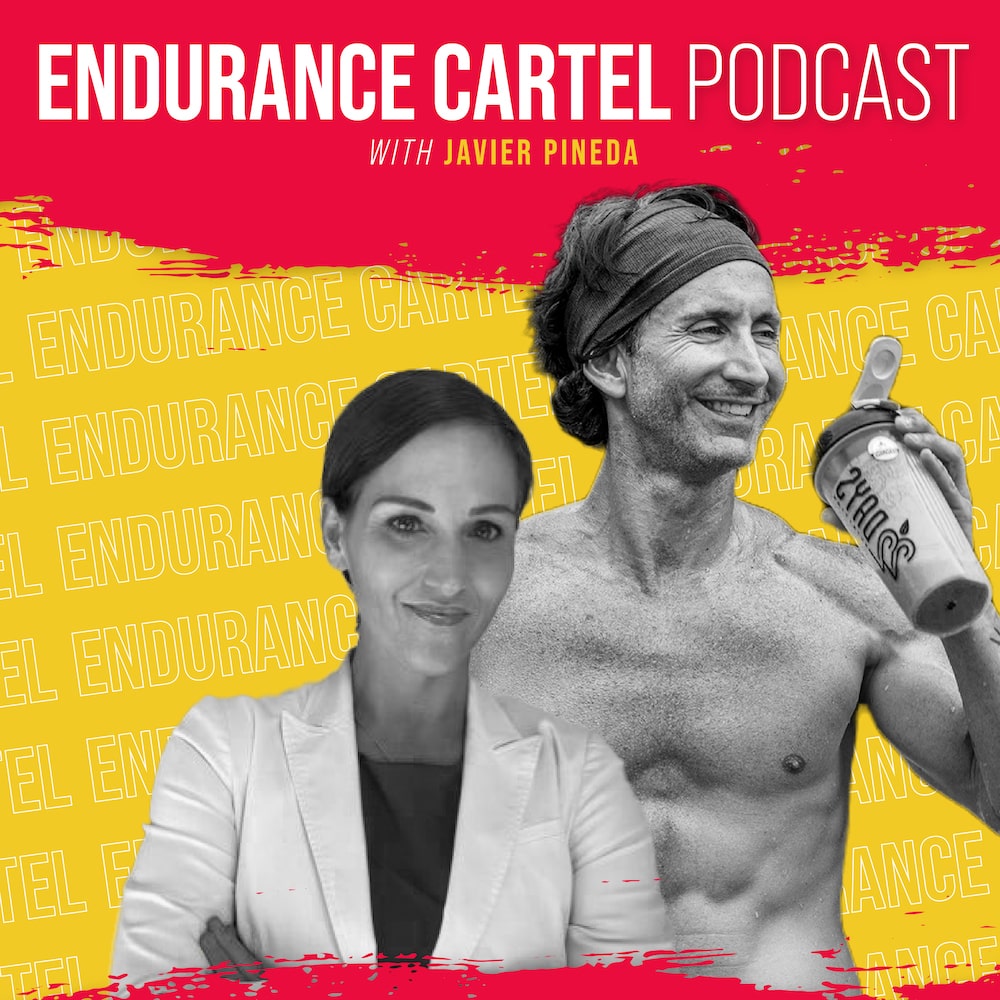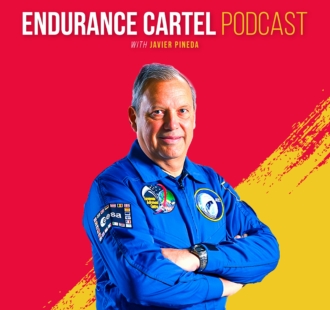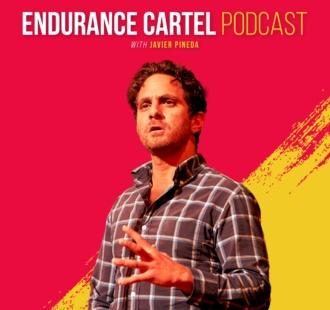
Dr. Mickey Witte joins Javier Pineda on The Endurance Cartel in a discussion about the impact food and unhealthy eating habits have on the quality of our lives.
Dr. Mickey is a Florida State University graduate with a Ph.D. in nutritional neuroscience and a passionate endurance athlete. As a multiple triathlon competitor and two times Ironman racer, she was always dedicated to better understanding the importance of a healthy, balanced diet in relation to our bodies performance.
In this episode, Dr. Mickey talks about how she discovered her passion for racing, how to identify what’s detrimental to your health in a world where processed food is already an addiction and how to listen to your body and its warning signals.
Dr. Mickey Witte, a Nutritional Neuroscientist, University Lecturer & Endurance Athlete
Dr. Michelina (“Mickey”) Messina Witte earned her Ph.D. and her MS in Neuroscience at the University of Florida. She won numerous prestigious awards in studies ranging from a potential cure for ALS (a.k.a. Lou Gehrig’s disease) to an addiction-related condition that was linked to sudden death. She is now concentrating her studies on Advanced Neurological Mechanisms of Obesity, Metabolism, Advanced Nutrition for Health and Fitness, and Nutritional Biochemistry at the University of Miami.
Outside of academia, Dr. Mickey is a devoted wife and mother of two young children. She is also a passionate endurance athlete, competing in numerous triathlons and two Iron Man editions so far.
Studying The Mechanisms of Obesity & Metabolism After Being an Overweight Teenager
“Obesity has always been fascinating to me,” says Dr. Mickey. As an overweight teenager, dr Mickey grew more and more interested in fitness. She tried to educate herself on the best ways to get strong and fit in a healthy way. After studying Psychology in college, she then went on to grad school. There, she chose to complete her studies in Neuroscience. Her decision was driven by her old passion for health and nutrition and understanding their impact on our lives.
“I love psychology, it’s a lot of theorizing about behaviour, which is fine, it’s helpful and it has its place. But then there was the neuroscience where you really get at the cell biology at the level of, you know, why are certain things happening, why are some people more prone to being overweight while others aren’t. We still have a problem, an obesity epidemic in this country, so to me, it was always fascinating.”
Competing in Numerous Triathlons & in Two Ironman Races
While in grad school, Dr. Mickey continued to be passionate about running and sports.
“I was a runner for a decade before I started down the triathlon rabbit hole and got hooked.”
While finishing her Ph.D. she met her husband, who was a law student. One of his professors was sadly diagnosed with ALS (Lou Gehrig’s disease). In hopes of bringing awareness to this chronic disease, Dr. Mickey enrolled in a triathlon. It was then that she fell in love with endurance competitions.
“I did a triathlon to raise money and awareness for ALS, thinking it was a one-off thing. I had no idea, one, that I would love it as much as I did, and two, that triathlon was this growing, burgeoning multi-sport lifestyle. And so, like many others who get into this sport, I got hooked and there was no looking back after that.”
There Is So Much Confusion Around Proper Nutrition & Eating Habits
As endurance sports have become increasingly popular, so has the need for understanding what a proper lifestyle should look like for these athletes.
As an endurance athlete herself, Dr. Mickey was always aware of the importance of keeping up to date with academic studies published on the subject and understanding the balance between healthy eating habits and the right training techniques. Unfortunately, despite all the information sources available now, there is still so much confusion around nutrition.
“I’m always asking kind of those science questions because to me, that’s truth. As a nutrition scientist, as someone who teaches, nutrition, it is very sad to see that, despite the fact that there is consensus about what’s optimal for us as a human species, for us as endurance athletes, there is still so much nutrition confusion out there.”
There are many factors that have a stake in the way we make decisions regarding our diet and eating habits.
“I’m not gonna blame one given entity on the fact that we’ve got rising rates of obesity and overweight in this country or in sports. But there are so many factors at play that make sure people continue to eat how they eat, make sure that they think it’s okay to reward themselves with whatever unhealthy thing it is that they’re eating.”
The Detrimental Effect Certain Foods & Eating Habits Have on Our Health; The “Blue Zones”
Heart disease, obesity, high blood pressure, elevated cholesterol, cancer, and depression. It all links to diet. But people refuse to understand the connection between these diseases and their unhealthy eating habits and appetite for over-processed foods that are widely available on the market.
“There is by no mistake that the number one killer of men and women on planet Earth is heart disease. People wanna see that bacon is back, people wanna see that butter is back. Is it really though? Does it really look healthy to you? We could go on and on about the nutrition science part of it, but I think it has to do a lot with the nutrition confusion that is being propped up by industry, by people, by entities that benefit from people still consuming their products, even though they know their products are not good for them.”
There are some exceptions though. According to a study made by Dan Buettner for National Geographic, there are certain areas in the world, called the “Blue Zones” where most of the population has lived over the normal life expectancy. The common denominator for their longevity is their plant-based eating habits. These communities put a great accent on staying active and keeping a high rate of whole foods in their diet.
“There was a higher amount of centenarians. People who are not just a hundred plus, and like existing, but a hundred plus and biking every day, swimming, going to their neighbors and cooking, living a full life still.”
Paleo, Keto, Fasting, Veganism- Why do Diets Usually Fail?
For decades now, Dr. Mickey is devoted to a whole food, plant-based nutrition lifestyle. She is adamant about dispelling the misconceptions and controversies around this subject and states that there are unmeasurable benefits to adopting this kind of lifestyle.
“That’s not to say I tell anyone that you must be vegan. While a vegan diet is just discarding animal products, whole foods, mostly plants is literally plants and food that look like they came in nature. Cause you can be a junk food vegan, you know? You can eat french fries and Oreos and those are still vegan, right? That’s not what I’m saying is healthy for you. You’ve got your legumes, which are beans, splits, chickpeas, lentils. Those are nutritional powerhouses. The amount of fiber that we get from legumes, from plants, which is the only place we can get fiber, is tremendously off the charts.”
When it comes to popular fad diets such as intermittent fasting, these tend to be the first to fail the expectation mark. The main reason is they promote results like fast weight loss without sufficient scientific evidence to support their claims. Despite all this, there are some benefits to them, if used in a correct manner.
“People misapply what science is saying. For example, intermittent fasting, or, what’s actually better termed as time-restricted feeding. It’s been shown to be beneficial in various ways when it comes to metabolism, body weight regulation, and blood sugar control. But people don’t apply it the way it was done in the studies. And so it’s ineffective because it’s not utilized properly.”
How do You Know When You’re Hungry or Full? Training Your Body to Listen to Your Hunger Cues
“We have stretch receptors in our guts that actually detect fullness physically. They send a signal to the brain to say when you’re physically full. We also have chemical receptors that detect the influx of macronutrients like carbohydrates, lipids, and proteins,” says Amanda.
These are just two of the many messengers or hunger cues that our body is equipped with. It takes approximately 20 minutes from the time you start eating for your brain to receive signals of fullness. Leisurely eating allows ample time to trigger the signals and send them to your brain. And feeling full translates into eating less.
Does Sleep Deprivation Influence Our Diet?
When sleep deprived, our brain tends to grab the fastest resources it can consume in order to stay awake.
“Every single cell in our body actually has a circadian clock. It functions in a circadian cycle. When you mess with that, every cell in your body gets confused. We call that circadian disruption and it impacts one’s likelihood of being obese or having metabolic problems. Your brain is foggy and it’s going to want to do the less amount of work possible to stay awake. ”
Generally, this translates into strong cravings for carb-rich foods and high intakes of sugar. And as a consequence, you develop those nasty eating habits.
“Everything that you consume is gonna get broken down into glucose. Whether you’re eating carb-rich foods, protein, or lipids, ultimately your body is going to transform them into glucose. Glucose is the easiest thing for your brain to use as energy. So it’s going to hog that up.”
Do your research before deciding what diet suits you
Nowadays, search engines and social networks are frequently used for health-related inquiries. With so many options and “advice” available online, another problem is surfacing. How do we spot what’s real and what’s fake, what information is accurate, and what information is misleading?
“As far as the information overload, in terms of all the influencers, all the self-proclaimed experts out there, we have to be really careful. It makes our job that much harder when people are out there kind of misinterpreting, not even maliciously or purposefully, but they’re out there misinterpreting the science. You have to be able to think critically. You can’t just take information and say that this must be the truth because this person seems legit.”
As an athlete, especially an endurance athlete, there is one thing you should pursue when choosing your diet, says Dr. Mickey.
“You want very low if no inflammation. The more your inflammatory system is revved up, the less capable it is to perform for you. As an athlete, you don’t want to have your blood moving slowly as you’re trying to oxygenate, as you’re trying to perform. So the less cholesterol and saturated fat you have in your blood, the better. The easiest way to get in that direction is to ditch the dairy.”
There are many healthy alternatives to dairy that are more likely to give you the nutrients that you need.
“Now you go down the dairy aisle in the store and you see a gazillion options, from soy to almond to oat. If you’re gonna go on the nutritional profile in terms of which one’s better, I’m gonna say soy, but anything that’s not dairy is better for you than the dairy alternative because it doesn’t have all that crap in it.”
Overweight models and body positivity
When it comes to body positivity, there is a line that we shouldn’t cross. Everyone deserves to feel good in their own skin. But what happens when people are just complacent and prefer to enjoy their comfort foods to the detriment of their own health?
“There’s a line between being positive about who you are and living in your own skin and promoting that kind of lifestyle. I think there’s a way where we can be both positive about our bodies and shapes and sizes, as well as still acknowledge that not all of them are in the best place for overall health and longevity.”
There are companies that are now promoting this new trend of overweight models. But their purpose is always related to money and exploring new marketing opportunities. So the best thing we can do for ourselves is to just listen to our own bodies and concentrate on being healthy no matter our size.
Launching “Eat So Simple”- a program to help people with food addiction and unhealthy eating habits
Currently, Dr. Mickey is preparing to launch a program called “Eat So Simple”. She created this program with a good friend of hers, Chuck Carroll, also known as “The Weight Loss Champion”. This program is deemed to help people who struggle with food addiction, but can also be a great tool for regular people who are looking for a sense of direction when it comes to their diet.
“Unlike addiction to substances or drugs of abuse, there’s no medical definition for food addiction. It’s getting there, but you can’t prescribe any type of treatment for someone because they’re a food addict, because we don’t yet have that medical diagnosis. So, we’re developing this really cool tool that people who deal with food addiction or feel like they have a loss of control over food intake can use to be able to look up how inherently addictive, so to speak, their food may be. It’s something that’s super new that I hope we will eventually publish, but also get into an academic realm with it and do some studies with it.”




Very insightful conversations! the guests are experts in the subject matter and the interview is easy to follow
All what DrWitte said in this podcast resonates to me, particularly when she says that what you get from endurance training and performing you translate it in life. How true this is!
Thank you for having such a smart, grounded and kind person in one of your podcast. Bring her back!!
Great podcast, thank you!